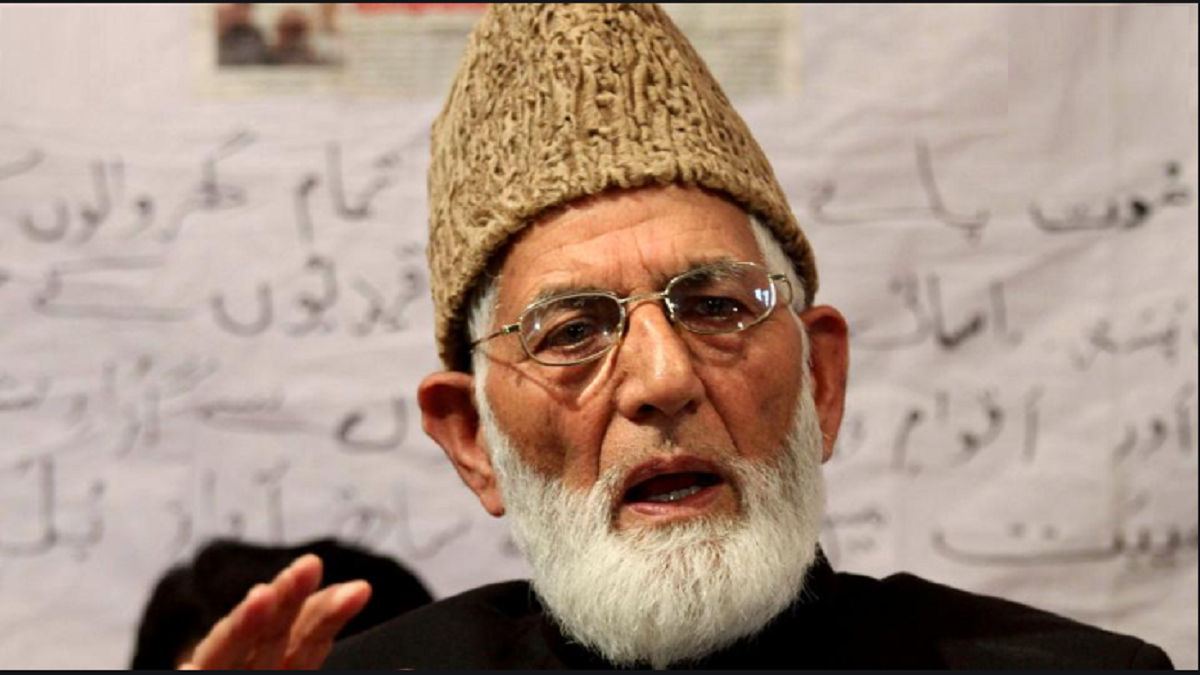Syed Ali Shah Geelani must be a relieved man now. The Pakistan Senate passed a unanimous resolution on 27 June 2020 conferring on him that country’s highest civilian honour, Nishan-ePakistan. Additional proposals to name a university after him and including his life story in Pakistani school curricula, already up to the brim with venom against India, are also on the anvil. After years of shouting from the rooftops that “Kashmir Banega Pakistan” and “Pakistan se Kashmir ka rishta kya, la ilaha illallah”, slogans most Pakistani Army generals and sleuths have cried themselves to sleep to and taken to their graves without any visible progress, Geelani has been able to turn their dreams partly into reality. Kashmir obviously will never become Pakistan in terms of a decrepit economy or being a slave to a foreign country, but in terms of deaths due to terrorist violence, it has come quite close to the failed state. And Geelani, the man who’s now enjoying his time under the sun is the one who is responsible for turning Kashmir into his own people’s graveyard.
Born in Sopore in 1929, Geelani completed his education at Oriental College Lahore and has been besotted with Pakistan ever since. A hardcore pro Pakistani, he has given multiple calls for violence within the Valley and defended the heinous actions of terrorist groups. For him, any violence can be justified as long as it is against “Indian imperialism”. Unfortunately, the same is echoed by a number of pseudo-academics within India such as Arundhati Roy, Varavara Rao and others. It is no secret that Geelani was revered by militant groups, particularly the Hizbul Mujahideen. In March 1992, Jammu Kashmir Liberation Front (JKLF) militants, then considered rivals to Hizbul, had to release Geelani just a couple of hours after they kidnapped him and were forced to issue an apology the next day. An ex member of Jamat e Islami Kashmir, he condemned the killing of Osama bin Laden by the Americans, holding a prayer for him in absentia. He also supported the 2001 attack on the Parliament as well as the 26/11 attacks in Mumbai. Leader of the Tehreek e Hurriyat, he has vehemently supported the erstwhile state’s absorption into Pakistan and propagated an extremely unsanitary and myopic view of Islam, poisoning the minds of entire generations.
Geelani never expressed regret for the massive Kashmiri loss of life through acts of terrorist violence, only focusing on the deaths of terrorists by security forces and branding them as innocent. His clarion call for violence in the aftermath of Burhan Wani’s killing engulfed the valley in a spiral of savagery that resulted in a number of civilian fatalities, most by Pakistani sympathisers, camouflaged as Kashmiris. As uncovered by detailed investigations by several media houses, Geelani’s interjection into the Burhan Wani episode helped lift a flagging terrorist campaign, already on death row, by allowing Pakistani operatives to enter Kashmir and brainwash innocent civilians. In some cases, the Pakistanis instigated clashes with security forces from among a crowd of Kashmiri people and then slunk away for the civilian population to bear the aftermath.
Geelani has always been feted by the Pakistani establishment and most Pakistani dignitaries, in the heyday of cordial relations between the two South Asian neighbours, made it a point to visit him at least once, transgressing Indian hospitality time and again. However, in the recent years he fell out of favor with the current political dispensation in Pakistan. The visits stopped and so did the praises, the encomiums from across the fence. The watershed moment for him was when he successfully opposed the Pakistani President Pervez Musharraf’s four-point formula (to resolve the Kashmir issue), which he considered as a compromise, given Geelani has always advocated J&K merger with Pakistan. With Geelani opposing Musharraf, all other separatists who were opening up to the idea fell like a pack of cards.
In fact, there was a fear that the nonagenarian would be expelled from the very party that he had founded specifically with the help of the ISI. However, the shrewd old man pre-empted this move and instead announced his resignation in June 2020. Geelani’s choice to not criticise Pakistan in his resignation letter directly but to attack Pakistan-backed separatist outfits is being seen as a call to “level” the status quo in Kashmiri separatism, ensuring entries of new actors while disciplining those who he perceives as uncommitted to the separatist cause. His preferred successor Abdullah Geelani is no favorite of the Pakistani establishment. In fact, he was the first one to complain about a scandal regarding selling of medical college seats exclusively reserved for Kashmiri students in POK, Lahore, Karachi and Islamabad by Ghulam Mohammed Safi, then convenor of the Muzaffarabad chapter of the APHC, in 2018.
Curiously, Geelani also leads a double life. Despite calling for secession and integration with Pakistan, he’s had seven surgeries in Delhi and Mumbai, accepts grants from the Indian and Kashmiri governments from time to time and has all his sons and daughters either studying or working in Indian cities. He also has a comfortable home in Delhi’s Malviya Nagar where he prefers to spend the coldest days of the winters, away from the kangri-infested harsh climate of his homeland. So much for being a revolutionary! India’s Enforcement Directorate raided his Delhi house and recovered millions of dollars worth property paid for by the ISI. The reality of a man, once known as the Omar Mukhtar of Kashmir, is not so inspiring and if told properly won’t even make it to the footnotes of the history chapters in the Pakistani academic curricula.

